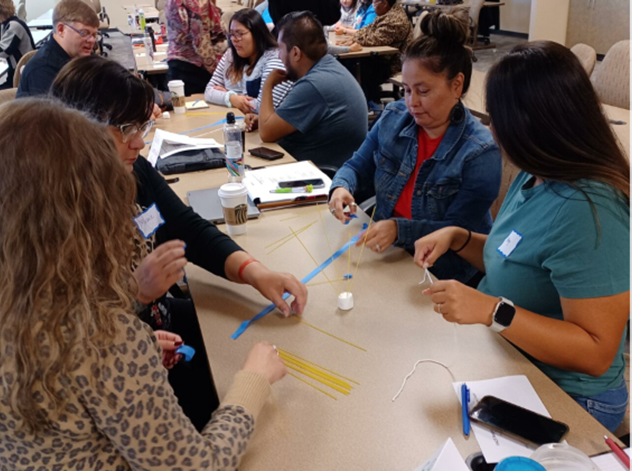The Heart of Family Learning: Driving positive change in communities through policy
Hello and happy new year! After taking a much-needed rest at the end of December, here at NCFL, we’ve hit the ground running in 2023! The turn of the year brings renewed hopes and dreams for families and communities, and we’ve recently learned news that has us very hopeful for the year to come!
_9.jpg)
The disruptions and setbacks caused by the pandemic illuminated how important parenting adults are to learning and student success, and families are now viewed more broadly as key partners in their child’s education. It is heartening to see that not only is this asset-based view gaining momentum with educators, administrators, and other community-based organizations but also is gaining traction among policymakers.
Just before concluding the 117th Congress, lawmakers came together in late December to approve a government funding deal for Fiscal Year 2023 that included landmark increases to programs that support high-impact family engagement and family learning. In addition to engaging with our national partners to advocate for these funding increases, NCFL has also conducted meetings with lawmakers and submitted feedback on Department of Education initiatives. We worked to showcase our successes and make the case for investments that elevate parent voice within the education system and support high-impact family learning systems. These investments serve to meet the needs of families and communities. Here’s a snapshot of programmatic funding that will benefit families furthest from opportunity:
.jpg)
The Statewide Family Engagement Centers (SFECs) received $20 million, a $5 million increase over the previous year. Last fall, the U.S. Department of Education awarded organizations with funding to establish or continue SFECs in eight states. With the increased funding, we’re optimistic that ED will grant additional awards in 2023 to support families in more states.

the learning impact for children and families in the FACE program
The Family and Child Education (FACE) program, the only early childhood program operated by the Bureau of Indian Education (BIE), received $25.3 million, amounting to a $3.6 million increase. FACE is carried out in 53 American Indian communities across 11 states. For more than 30 years, NCFL has partnered with the BIE to provide training and support to educators who teach American Indian families participating in the FACE program.
I would like to give special thanks to Congressman John Yarmuth, who retired with the conclusion of the 117th Congress, for his support in securing a Community Funding Project that will allow NCFL to support and expand our Carnegie Family Science Project in Louisville, Kentucky. Congressman Yarmuth has been a longtime advocate for improving adult learning and family literacy outcomes, helping to build national awareness of both throughout his time serving in the House of Representatives. With seed funding provided by the Carnegie Corporation of New York, this project will engage students, their families, and school-based personnel by providing more innovative and equitable science-based educational opportunities. This project not only responds to the ongoing needs of educators to adapt by building their capacity to work alongside families in new ways, but will accelerate learning outcomes for families through projects that are connected to school-based OpenSciEd curriculum.
In addition to these funding increases, the following programs also received increased funding:
- Full-Service Community Schools: $150M ($75M increase)
- Title I Grants to LEAs: $18.3B ($850M increase)
- Comprehensive Literacy Program: $194M ($2M increase)
- Student Support/Academic Enrichment Grants: $1.38B ($100M increase)
- Adult Ed State Grants: $729M ($25M increase)
These are huge wins for families and communities across the country!
NCFL’s vision is that by 2030, aligned and coordinated family learning systems are established in 60 communities, built with and for families, to increase education and economic outcomes, creating more equitable communities. What drives change in communities is working across programming, training, research, evaluation, and policy. To truly spread and scale our work in communities nationwide, we must work locally with community partners as well as with policymakers at all levels.
In 2023, NCFL will continue to build on our federal policy work to ensure that elements of the Family Learning System (family literacy, family engagement, and family leadership) are supported. This work, along with NCFL’s efforts to identify strategic partnership opportunities with states and districts, will support achieving our 60×30 Vision. To learn more about our 60×30 Vision, read my past blog posts.
If you are part of a community that is ready to embark on this work with us, please reach out to info@familieslearning.org.
ABOUT THE AUTHOR

A lifelong educator and national thought leader for teaching and learning, Dr. Felicia C. Smith brings decades of valuable experience to advance NCFL’s mission of working to eradicate poverty through education solutions for families. Having served in a variety of leadership roles in P-12, higher education, nonprofit, and philanthropy, her career has allowed her to experience leading systems and develop a unique vantage point of a learner’s educational trajectory from preschool to adulthood. Smith holds an Ed.D. in education leadership and administration from the University of Kentucky, and an M.A. in elementary education with an emphasis on K-12 literacy development and B.S. in elementary education from the University of Louisville.